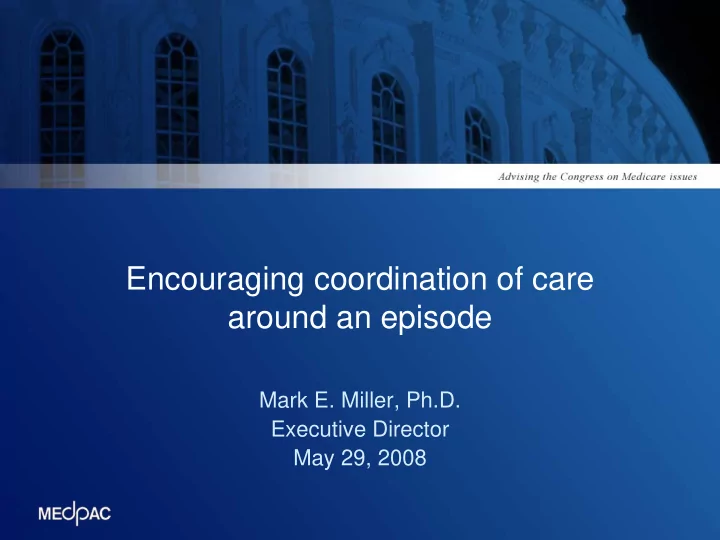

Encouraging coordination of care around an episode Mark E. Miller, Ph.D. Executive Director May 29, 2008
Traditional Medicare does not reward efficiency or quality � No financial incentive to work cooperatively to manage patients’ care over time � Providers paid in silos � Gainsharing restrictions � No longitudinal accountability � As a result � Medicare’s payments do not reward quality � Medicare and beneficiaries spend more than is needed 2
Policies to encourage joint accountability and efficiency � Permit shared accountability (i.e., gainsharing) � Reduce payments for providers with high readmission rates � Test bundled payment for episodes of care 3
Shared accountability arrangements (gainsharing) � Hospitals and physicians agree to share savings from reengineering clinical care in the hospital � E.g., reducing use of unnecessary supplies, complying with clinical protocols, standardizing devices � Have potential to encourage cooperation among providers in reducing costs and improving quality 4
Most shared accountability arrangements are prohibited by statute � OIG: Gainsharing prohibited by provision that bars hospitals from offering physicians incentives to reduce/limit services to Medicare patients � Might also violate anti-kickback statute � OIG approved narrow arrangements with safeguards that protect quality and minimize incentives that could influence physician referrals 5
Commission supports shared accountability with safeguards � The Congress should grant the Secretary the authority to allow and regulate shared accountability arrangements (MedPAC, Report to the Congress: Physician-owned specialty hospitals, 2005) � Secretary should develop safeguards to protect quality and minimize financial incentives that could affect referrals 6
New study finds that gainsharing reduces costs without harming quality or access � Study of 13 gainsharing programs involving coronary cath labs � Ketcham and Furukawa, Hospital-physician gainsharing in cardiology, Health Affairs 27, no. 3 (May/June 2008) � Gainsharing reduced costs by 7% per patient; most savings from lower stent prices � No increase in risk of complications � Greater use of care recommended by clinical guidelines 7
Preventable readmissions � Some readmissions occur that could have been prevented. May be due to � Medication errors � Patient confusion about medications and self-care � May not know of end-of-life options � An inpatient adverse event � Poor communication between providers at hand- offs � Some hospitals have addressed these problems to reduce readmission rates 8
Readmission rates point to need for greater care coordination Readmissions 7-day 15-day 30 day Percent readmitted 2005 6.2% 11.3% 17.6% Percent potentially preventable (3-M logic) 5.2 8.8 13.3 Spending on potentially preventable (billions) $5 $8 $12 Source: MedPAC, Report to the Congress: Promoting greater efficiency in Medicare , June 2007. 9
MedPAC recommendations related to changing payment policy for readmissions � Inform providers of their risk-adjusted readmission rates; later, publicly share this information � Reduce payments to hospitals with relatively high readmission rates for select conditions � Allow shared accountability between physicians and hospitals 10
Bundling payment can improve incentives for efficiency � Under bundled payment, Medicare pays a single entity an amount intended to cover the full range of costs of an episode � Encourages restraint in the volume of service under the bundle. More services are not rewarded with increased payment � Providers are motivated to collaborate with partners to improve collective performance 11
Concurrent accountability for quality of care is essential � Value is a function of both resource use and quality � Quality accountability is particularly important when bundling payment – it is a check on the incentive to stint 12
Bundling around a hospitalization is a good place to start � Hospitalization is a clear, cogent episode of care � Hospitals’ managerial and financial resources and economies of scale can be an asset in enabling delivery system reforms � To gain experience, achieve early success and limit unintended consequences, a bundling policy could first apply to select conditions 13
Value in defining episodes beyond stay � Why is it important to ultimately define episodes that extend beyond the stay? � It is in this post-discharge window that most variation in spending occurs � For example, spending on readmissions and post-acute care varies widely. 14
Recommendation on bundling � Report resource use around hospitalization episodes � Launch a voluntary pilot program to test the feasibility of bundled payment for select conditions 15
CMS demonstrations consistent with many of the MedPAC’s priorities � Medicare Hospital Gainsharing Demonstration Program � Physician Hospital Collaboration Demonstration � Examine impact of gainsharing on longer-term outcomes and service use � Acute care episode demonstration 16
Recommend
More recommend